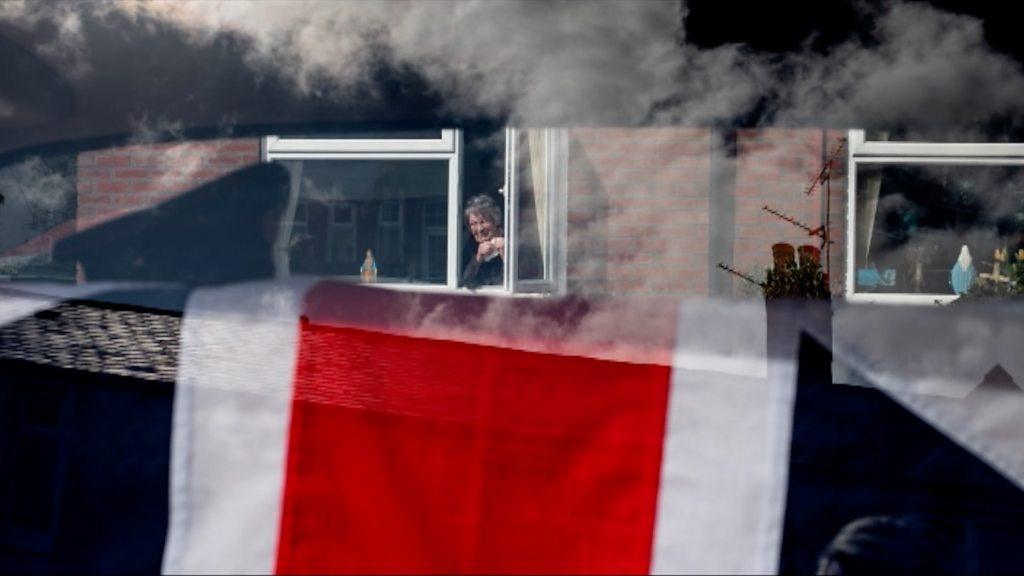Coronavirus: How are we paying our respects under lockdown?
- Published
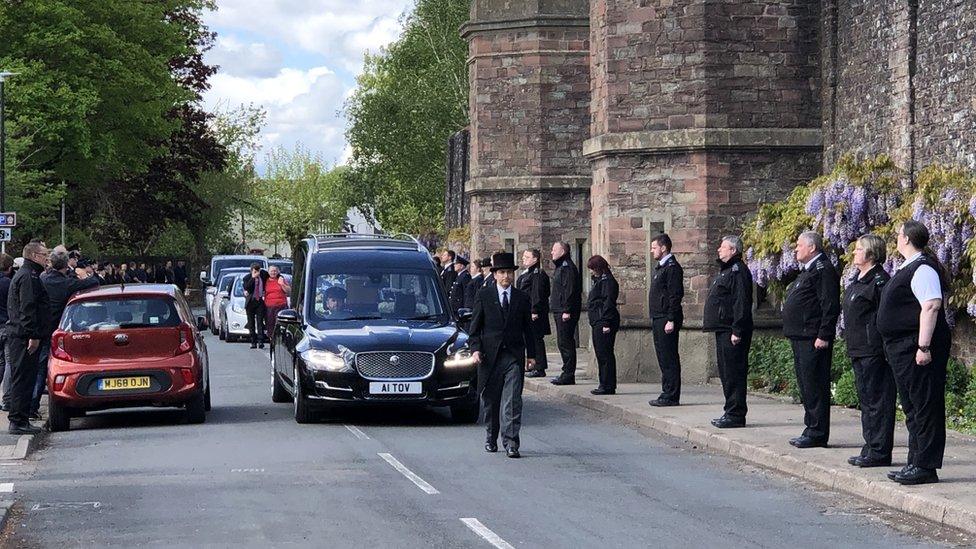
A guard of honour paid tribute to Rachael Yates as her funeral cortege passed Usk Prison, where she worked
Watching online, clapping as a hearse goes past or simply sending messages of support are some of the ways we are paying our respects during lockdown.
Social distancing rules mean most funerals are now limited to close family.
Funeral director Stuart Booth said mourners now "appreciate the little things".
He said the ways communities have shown support is what will stick with him from the coronavirus pandemic.
Laugharne-based Mr Booth believes lockdown has meant mourners now realise they do not need "jazz bands, bells and whistles" at funerals and little gestures mean a lot more.
"People always used to do it (acknowledge a passing hearse) but it seemed to die out. Workmen used to take their hard hats off, but most don't notice now. It had been lost," said Mr Booth.
"But since lockdown, we have had neighbours out on the streets to see the hearse. It's one of the things that is going to stay with me. It's touching and has brought back an old tradition."
He described families being "overwhelmed" at seeing neighbours on doorsteps, saying it made a "big, big difference" to see others were thinking of them.

Razza Ghulam, left, and Ghulam Abbass died within hours of one another
Brothers Ghulam Abbass, 59, and Razza Ghulam, 53, whose family ran a newsagents in Pill, Newport, died after contracting coronavirus.
Only a few relatives could attend when they were buried near their dad at St Woolos Cemetery, with people finding another way to show the family they cared.
Rukhsar Abbass, daughter of Ghulam Abbass, said: "I didn't realise how much of a well-known family we had, and how much of an impact my father and his brother had on the community, until now.
"We've had so many messages of support from members of the community and further afield, and even MPs have contacted us to send their condolences.
"It shows the kind of men they were. We're all so proud of them and are totally heartbroken."

The family of the brothers are well-known for running a newsagents in Commercial Road, Pill, for more than 20 years
On Friday, Rachael Yates' send off from the town "dear to her heart" saw a guard of honour and people standing outside their homes clapping as her hearse went past.
Her family believed the church would have been full of mourners for the 33-year-old, who became the first Welsh prison officer to die after contracting coronavirus.
"Rachael loved Usk, and the family thought it would be appropriate to drive her one last time through the streets, which she considered her home," they said before Friday's funeral.
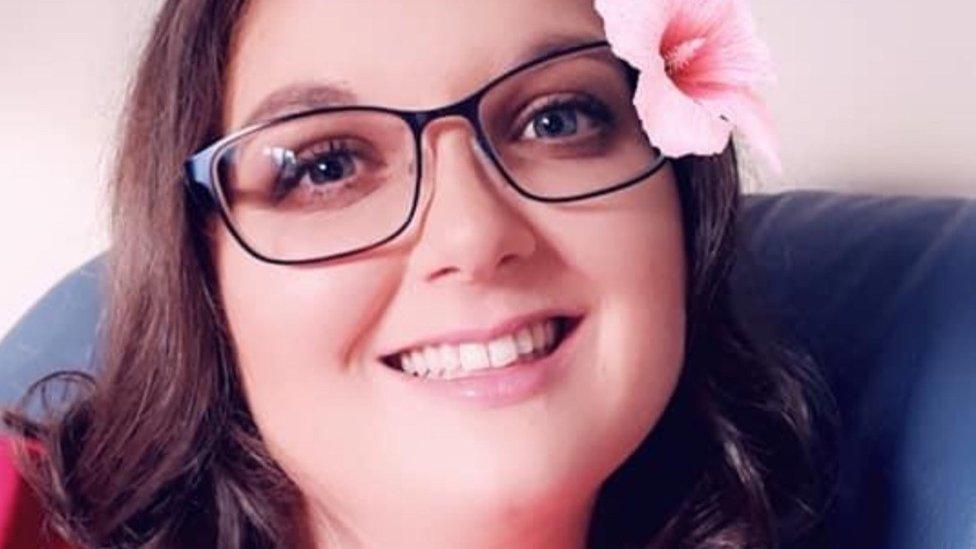
Rachael Yates is the first prison officer in Wales to have died with Covid-19
The hearse left the Tovey Brothers funeral home in Newport at 14:30 BST, travelling to Usk Prison, where Rachael's former colleagues made a guard of honour, before passing Twyn Square and Usk Post Office, where she had also worked.
While mourners could not then accompany a horse drawn carriage to St Woolos Cemetery for the funeral, they clapped the coffin through the Monmouthshire town following social distancing rules.
Welsh Government guidance does not set limits on numbers at funerals but insists attendees stay 2m (6ft 6ins) apart.
Woman 'couldn't hug anybody' after husband's death
At the start of the outbreak, Susan Cadogan, from Cardiff, described how social distancing rules meant she could not go to husband Peter's funeral.
He had died of cancer of 3 March, and she said: "I couldn't hug anybody, they couldn't hug me. I couldn't go up to the coffin and say goodbye."
Only 10 people were allowed to attend the funeral of former Wales rugby player Matthew Watkins, with people urged to watch online wearing the jerseys, ties and pin badges of their clubs, and post photographs online.
But since then, social media has been used in a very different way to help communities pay respects - detailing where a hearse will be at a particular moment and ensuring people can wave, bow or clap as it goes past.
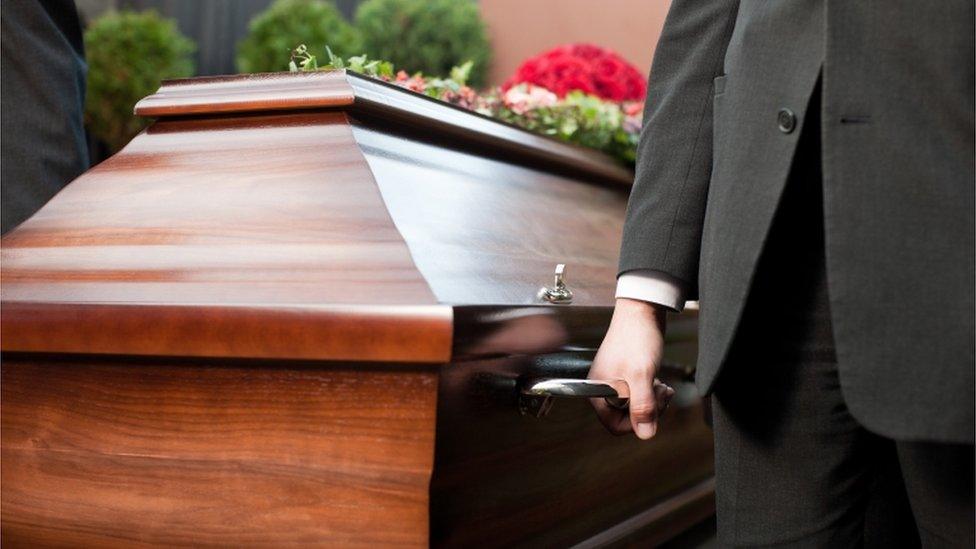
The nature of funerals has changed - but people are still showing their respects
Funeral director Mr Booth works for Peter Evans Funeral Directors and it posted a message urging people to "take off your cap and bow your head" and help to "revive old traditions".
The notice on its Facebook page, external received a massive reaction, with Natalea Refaux saying: "I'll never forget a gentleman doing this at the side of the road as we passed with my Granda.
Old traditions
"He stopped, took his cap off and bowed his head," she said.
"I was so young, yet 40 years later and that image has never left me."
Simon Moxon described always saluting a passing hearse during 30 years in the police, while Nicola Baker said "many of us oldies stop and bow our heads".
Debbie Dalzell said: "We buried my ex-husband on 23 March with only close family and we were humbled when two road maintenance workers saw the hearse, stopped and took their hard hats off. Was very emotional."
- Published8 April 2020

- Attribution
- Published31 March 2020

- Published24 March 2020
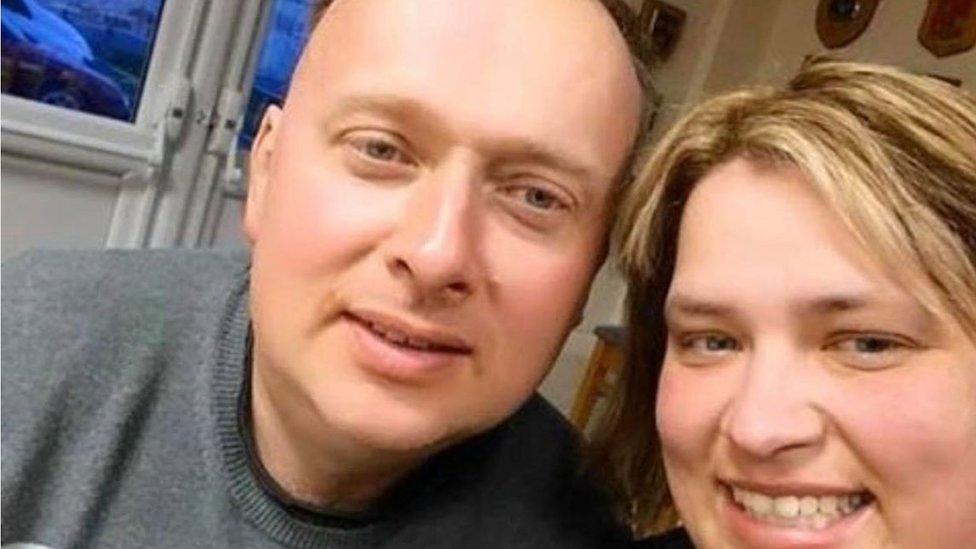
- Published9 April 2020
